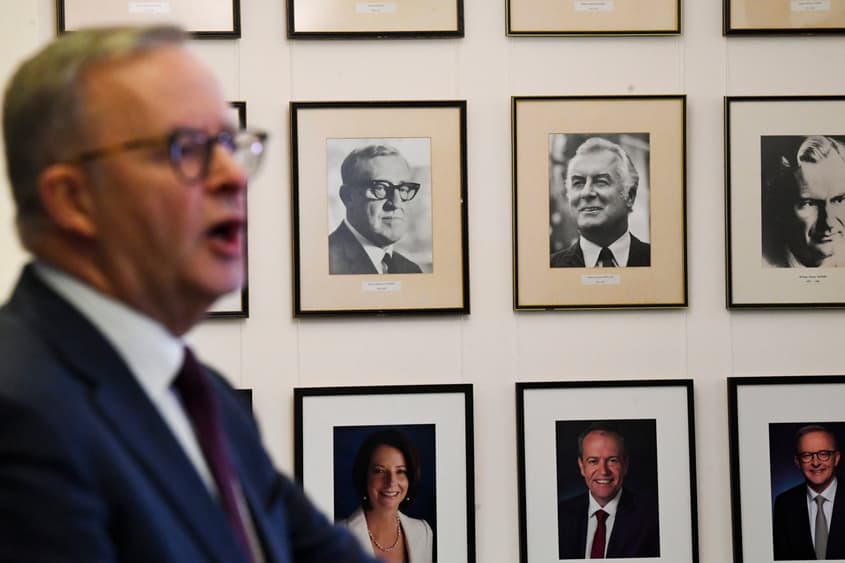Tue 12 Aug 2025 00.00

Photo: AAP Image/Lukas Coch
The Australian Labor Party is as much a broad church as John Howard once proclaimed the Liberal Party to be. The Labor Party contains multitudes, from conservative Catholics who openly opposed same-sex marriage to openly gay and now legally married members; free marketeers and staunch interventionists; budget hawks and proud Keynesians; and of course, those who accept the science of climate change and those desperate to drive fossil fuel expansion. Disagreements about principles, policies and political strategy are common in any large group, but what matters for the country is not that differences of opinion exist in a party, but how a party manages those differences. Unfortunately, in Australia, the credo that division is death is so widely accepted across all of our political parties that the media treats the mere whiff of public difference of opinion not as inevitable, or even healthy, but toxic.
Australian parliaments are dominated by strict party discipline. This was on display when Senator Fatima Payman crossed the floor, voting against a Labor decision not to recognise Palestine. This led to her leaving the Labor Party. The ALP is particularly rigid when it comes to the requirement of all its MPs to vote for the party position all of the time. Elsewhere in parliament while crossing the floor to vote against your party is permitted by the Liberals, the Nationals, One Nation and the Greens it is by far the exception rather than the norm.
Crossing the floor is deeply discouraged in Australian parliamentary culture, and sometimes even a sackable offence, but that is not the case in most parliaments around the world. The so-called Westminster system is not based on binding bloc voting and those elected to Congress in the US vote according to their personal views rather than the party line so often that there isn’t even a widely used term for the practice. They simply think of it as voting.
While uncommon around the world, binding all members of a political party to vote as a bloc, as instructed by the party leadership, has several advantages for a political party, and especially for its leaders. Indeed, bloc voting likely has some benefits for voters, who instead of taking the time to get to know the principles, priorities and policies of those aspiring to be their local member in the House of Representatives, can simply listen to what the prime minister or opposition say and then trust their local MP will vote as instructed. But there are costs to such an approach to party discipline.
All MPs get a voice in their party room debates about policy and priorities, but once a party room decision is made, all voices support it as one, whether they believe in it or not. In turn, when you hear a minister mounting a passionate defence of their party’s position on why it is irresponsible to increase unemployment benefits, good for the climate to expand gas and coal production, or responsible for Australia to rely on Donald Trump and all future US presidents to honour the terms of our AUKUS alliance, you have no idea if the minister actually believes a word they are saying or not. The minister with the loudest voice supporting a position may well have led the charge against it in the party room and the cabinet.
While political autobiographies are full of former politicians telling of their private bravery, and no doubt the coming decades will be full of mea culpas from MPs wishing their private urgings had delivered more to tackle Indigenous disadvantage, rising inequality and climate change, Australian political culture means that those in power are not just required to vote for legislation they oppose, but to publicly attack advocates they agree with.
Some may remember that Paul Keating once failed to convince his party to adopt a GST and then proudly destroyed John Hewson’s proposal to deliver Keating’s preferred tax reform. Peter Garrett once ran as a candidate for the Nuclear Disarmament Party but subsequently made the case for the expansion of uranium mining when he was a Labor minister. In the words of Kevin Rudd,
Any political party … contains within it a whole range of views which we formalise through democratic processes … And guess what? Not everyone always gets their own way — I don’t get my way on everything — I understand that. Therefore, it is our job, however, to take our unified message out to the Australian people.
Peter Garrett subsequently wrote that supporting Rudd was the biggest mistake he made in his political career.
And more recently, Senator Penny Wong spent years strongly arguing against the right of same-sex couples to marry, including on the basis that “cultural, religious, historical view … this is an institution that is between a man and a woman”.
To be clear, when Penny Wong told us she opposed same-sex marriage she was doing her job of supporting current Labor policy whether she supports it or not, a job she clearly doesn’t resile from. When Senator Fatima Payman quit the Labor Party on the basis she could not vote against a motion supporting Palestine, Senator Wong said, “We understand the importance of caucus solidarity. It is very rare for a Labor person not to respect that. It’s a principle which has served us well.”
The problem is not that politicians openly support policies that they disagree with and attack advocates outside their party they do agree with, it’s that our public debate takes the arguments, and attacks made on others, seriously. To be clear, at the same time centrists in the media and pragmatists in NGOs are supporting government policies as the best available option, some of the ministers promoting those same policies, and mocking those with greater ambition, will almost inevitably have spoken against those same ideas in the party room and in cabinet. How can we have serious debates about important issues when many of those involved are obliged to keep their thoughts to themselves and demean those they agree with?
No wonder people are losing faith in democracy. We have built a system where party control supersedes personal conscience, and worse, a system where those MPs who are seen to have integrity on an issue are more likely to be used as battering rams against their external allies while privately supporting ideas and values they publicly deride.
It is no coincidence that the number of Australians voting for independents and minor parties is rising so rapidly. The problem for major parties is not that their candidates are bad people. The problem is that, given the option of representatives who simply parrot the party line and those who can say what they genuinely believe and vote according to their conscience on every issue, voters are increasingly choosing independents. The problems for major parties are particularly acute when they try to convert questions of morality into a centrist compromise. While moral gymnastics and strict adherence to agreed talking points might keep a large party room together, such centrist compromising often leaves voters cold.
Richard Denniss is Executive Director at The Australia Institute. This is an excerpt from his Vantage Point essay, Dead Centre: how political pragmatism is killing us.
